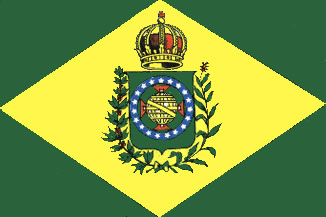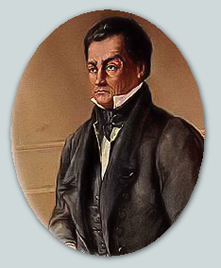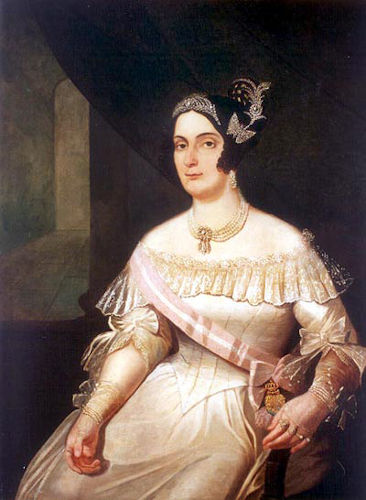Chapter 3 A Compromise and a War
Chapter 3
A Compromise and a War
The drafting of the Constitution only began on June 7, 1825, due to most propositions being blocked by either one faction or the other, and now that the Liberals were now part of the Assembly, it became even more difficult to implement changes.
However, Bonifácio managed to have a deal with the Moderates, by which the Moderates would accept the Emperor having more power in exchange for the establishment of an unicameral Congress that would deal with some internal issues (Taxation, landownership, city planning and management and education) whilst matters of foreign policy (or who were intimately related to foreign policy, such as trade and slavery) would be in the hands of the Emperor. Bonifácio hoped that his ideas, such as building a capital in the center of the country and land reform would fall in the hands of the Emperor (Which he believed could be convinced into adopting these reforms), however, they fell to the Congress.
Suffrage was to be both limited and expanded. It was given that to vote, a man must be a Catholic, not be a slave or illiterate and have a certain amount of wealth. The wealth requirements would be lowered so as to allow the highest echelons of the middle classes - Represented by the Moderates - to vote.
The Compromise was originally supposed to be the reverse, as the Moderates feared that Pedro I would be an expansionist who would throw young Brazil into a potentially devastating war with Portugal or Argentina. In a failed attempt, the Independists tried to add a clause that proclaimed the annexation of Grão-Pará as a state goal in the Constitution, but were rejected by the leaders of their factions.
The Constitution was approved by Pedro I, who enjoyed the powers that he now held on matters of foreign policy.
By early October 1825, things were going well. The military was quickly modernizing; Congress on its first session was functioning, even if slowly; and many Brazilians felt that after a rough independence war, the country was on a path toward peace and prosperity.
The United Provinces of the Rio de La Plata had other plans.

Flag of the Province of Cisplatine
While by September some revolts were taking place in the Cisplatine region, they were small enough not to alarm anyone besides regional authorities. The Battle of Sarandi, which was fought using local troops and under an inept commander, resulted in a worrying Brazilian defeat. This inspired the United Provinces of the Rio de La Plata to declare the annexation of Banda Oriental into the country on October 25, 1825.
Whilst this was happening, Pedro I's heir, Pedro II, had just been born in Rio de Janeiro, and Pedro I was extremely happy about having an heir and of being a father.
He however had to go back to the reality of administering a country, and declared war on the United Provinces on December 10, 1825, starting the Cisplatine War.

Battle of Sarandi
The war was gruesome and thousands of both Brazilians and Argentines would die during the conflict. It was, however, a decisive Brazilian victory.
Argentina, assuming that the Brazilian loss of the Amazon would mean a weakened Brazil, invaded the country on the assumption that they would be able to have a quick win and annex Cisplatine, and after that Pedro I would simply give up on the war and sign a peace treaty. They did not take into account the fact that both the Brazilian Navy and Army were being modernized at a quick pace. The Argentines were defeated in land, and were crushed at sea, with the Argentine fleet being almost completely destroyed, and its admiral, William Brown, killed in battle. By February 1826, Brazilian troops were marching on Misiones and were pressing their advantage. [1]
The Argentine government quickly sued for peace by May 1826. Pedro I, hoping to satisfy the Independist movement and also strengthening his popularity, pressed for the annexation of the provinces of Misiones, Corrientes and Entre Ríos.
Brazil not only managed to defend and keep Cispatine, but also annexed three provinces of Argentina.
In a controversial move, however, that has been characterized as one of the most disgusting and illegal actions by Brazil, 70 thousand people living in those three provinces were forcibly removed and pushed into Paraguay or Argentina between June 1826 and October 1826. Although Argentina protested this move, it was too weak to do anything of note about it. About 7 thousand - one-tenth - of those people died on the way. The 'Death Road' (Estrada da Morte) remains one of the darkest chapters of the reign of Pedro I and contemporany historians have subjected it to a much deeper analysis after this event had been ignored by historians for almost two centuries.
Nevertheless, it seemed like Pedro I was more powerful and more well-regarded than ever before. The modernization of the Army, the Constitution that gave him some powers, the birth of an heir and a big victory in a war seemed to make up for his "loss" of the Amazon.
It seemed like everything was going Pedro I's way.


Flag of the Empire of Brazil and Pedro I
[1] IOTL, the Brazilians tried to invade this region in March and November of 1826, but were pushed back by the Argentines. With a stronger Brazilian Army, this would succeed with an one-month advantage
After the Brazilian victory and the signing of the Treaty of Colónia do Sacramento, nationalism in the country was at an all-time high and many politicians (Mostly Conservative) who opposed the war were badly defeated in the June 1826 Parliamentary election. This new Liberal-Moderate coalition was based on the 'Letter of The Three Principles' (Carta dos Três Princípios), a letter signed by Diogo António Feijó [1] and José Bonifácio.

Diogo António Feijó
The Three Principles that the letter enumerates are:
1 - Reducing the slave trade, with the objective of it being totally phased out by 1836
2 - Land reform. All unproductive government property would be seized and redistributed
3 - "Peopling" of the interior. In conjuction with point number 2, Lusophone migrants would settle in the Brazilian West and in the Cisplatine region + the "Mesoplatina" territory (The conquered Argentine provinces). This would be done to prevent the Hispanicization of those regions and to defend the borders of Brazil
The first point was done with the introduction of the Feijó Law (Lei Feijó), which passed the Assembly on August 1826. It tried to reduce the flow of trafficked slaves to Brazil, with both British and Portuguese assistance in the seas.
The second was accomplished by the so-called Land Laws (Leis da Terra), which passed the Congress on August 1826, it gave away many government-owned lands to Lusophone (Portuguese or Brazilian, as Bonifácio wanted) farmers to settle and cultivate in. They also managed to succeed on the third front by creating mechanisms to incentivate these Lusophones to settle and live in the Brazilian West, Cisplatine and "Mesoplatina" region.
[1] IOTL the two were political rivals and Feijó founded the Liberal Party in 1831, following Pedro I's abdication. However, due to the butterflies, he gets involved in politics earlier, and while still divergent with some of Bonifácio's views, agrees with him in some other issues
All credit to our good friend @unnaturalmilk
A Compromise and a War
The drafting of the Constitution only began on June 7, 1825, due to most propositions being blocked by either one faction or the other, and now that the Liberals were now part of the Assembly, it became even more difficult to implement changes.
However, Bonifácio managed to have a deal with the Moderates, by which the Moderates would accept the Emperor having more power in exchange for the establishment of an unicameral Congress that would deal with some internal issues (Taxation, landownership, city planning and management and education) whilst matters of foreign policy (or who were intimately related to foreign policy, such as trade and slavery) would be in the hands of the Emperor. Bonifácio hoped that his ideas, such as building a capital in the center of the country and land reform would fall in the hands of the Emperor (Which he believed could be convinced into adopting these reforms), however, they fell to the Congress.
Suffrage was to be both limited and expanded. It was given that to vote, a man must be a Catholic, not be a slave or illiterate and have a certain amount of wealth. The wealth requirements would be lowered so as to allow the highest echelons of the middle classes - Represented by the Moderates - to vote.
The Compromise was originally supposed to be the reverse, as the Moderates feared that Pedro I would be an expansionist who would throw young Brazil into a potentially devastating war with Portugal or Argentina. In a failed attempt, the Independists tried to add a clause that proclaimed the annexation of Grão-Pará as a state goal in the Constitution, but were rejected by the leaders of their factions.
The Constitution was approved by Pedro I, who enjoyed the powers that he now held on matters of foreign policy.
By early October 1825, things were going well. The military was quickly modernizing; Congress on its first session was functioning, even if slowly; and many Brazilians felt that after a rough independence war, the country was on a path toward peace and prosperity.
The United Provinces of the Rio de La Plata had other plans.

Flag of the Province of Cisplatine
While by September some revolts were taking place in the Cisplatine region, they were small enough not to alarm anyone besides regional authorities. The Battle of Sarandi, which was fought using local troops and under an inept commander, resulted in a worrying Brazilian defeat. This inspired the United Provinces of the Rio de La Plata to declare the annexation of Banda Oriental into the country on October 25, 1825.
Whilst this was happening, Pedro I's heir, Pedro II, had just been born in Rio de Janeiro, and Pedro I was extremely happy about having an heir and of being a father.
He however had to go back to the reality of administering a country, and declared war on the United Provinces on December 10, 1825, starting the Cisplatine War.

Battle of Sarandi
The war was gruesome and thousands of both Brazilians and Argentines would die during the conflict. It was, however, a decisive Brazilian victory.
Argentina, assuming that the Brazilian loss of the Amazon would mean a weakened Brazil, invaded the country on the assumption that they would be able to have a quick win and annex Cisplatine, and after that Pedro I would simply give up on the war and sign a peace treaty. They did not take into account the fact that both the Brazilian Navy and Army were being modernized at a quick pace. The Argentines were defeated in land, and were crushed at sea, with the Argentine fleet being almost completely destroyed, and its admiral, William Brown, killed in battle. By February 1826, Brazilian troops were marching on Misiones and were pressing their advantage. [1]
The Argentine government quickly sued for peace by May 1826. Pedro I, hoping to satisfy the Independist movement and also strengthening his popularity, pressed for the annexation of the provinces of Misiones, Corrientes and Entre Ríos.
Brazil not only managed to defend and keep Cispatine, but also annexed three provinces of Argentina.
In a controversial move, however, that has been characterized as one of the most disgusting and illegal actions by Brazil, 70 thousand people living in those three provinces were forcibly removed and pushed into Paraguay or Argentina between June 1826 and October 1826. Although Argentina protested this move, it was too weak to do anything of note about it. About 7 thousand - one-tenth - of those people died on the way. The 'Death Road' (Estrada da Morte) remains one of the darkest chapters of the reign of Pedro I and contemporany historians have subjected it to a much deeper analysis after this event had been ignored by historians for almost two centuries.
Nevertheless, it seemed like Pedro I was more powerful and more well-regarded than ever before. The modernization of the Army, the Constitution that gave him some powers, the birth of an heir and a big victory in a war seemed to make up for his "loss" of the Amazon.
It seemed like everything was going Pedro I's way.


Flag of the Empire of Brazil and Pedro I
[1] IOTL, the Brazilians tried to invade this region in March and November of 1826, but were pushed back by the Argentines. With a stronger Brazilian Army, this would succeed with an one-month advantage
After the Brazilian victory and the signing of the Treaty of Colónia do Sacramento, nationalism in the country was at an all-time high and many politicians (Mostly Conservative) who opposed the war were badly defeated in the June 1826 Parliamentary election. This new Liberal-Moderate coalition was based on the 'Letter of The Three Principles' (Carta dos Três Princípios), a letter signed by Diogo António Feijó [1] and José Bonifácio.

Diogo António Feijó
The Three Principles that the letter enumerates are:
1 - Reducing the slave trade, with the objective of it being totally phased out by 1836
2 - Land reform. All unproductive government property would be seized and redistributed
3 - "Peopling" of the interior. In conjuction with point number 2, Lusophone migrants would settle in the Brazilian West and in the Cisplatine region + the "Mesoplatina" territory (The conquered Argentine provinces). This would be done to prevent the Hispanicization of those regions and to defend the borders of Brazil
The first point was done with the introduction of the Feijó Law (Lei Feijó), which passed the Assembly on August 1826. It tried to reduce the flow of trafficked slaves to Brazil, with both British and Portuguese assistance in the seas.
The second was accomplished by the so-called Land Laws (Leis da Terra), which passed the Congress on August 1826, it gave away many government-owned lands to Lusophone (Portuguese or Brazilian, as Bonifácio wanted) farmers to settle and cultivate in. They also managed to succeed on the third front by creating mechanisms to incentivate these Lusophones to settle and live in the Brazilian West, Cisplatine and "Mesoplatina" region.
[1] IOTL the two were political rivals and Feijó founded the Liberal Party in 1831, following Pedro I's abdication. However, due to the butterflies, he gets involved in politics earlier, and while still divergent with some of Bonifácio's views, agrees with him in some other issues
All credit to our good friend @unnaturalmilk


